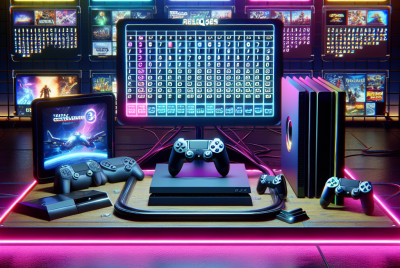Game On: Timeless 90s Classics That Are Still Fun Today
Game On: Timeless 90s Classics That Are Still Fun Today
The 1990s were a golden decade for video gaming, marked by the emergence of groundbreaking technology and captivating storytelling. A host of classic games released during this time laid the foundation for modern gaming. Even decades later, many of these titles retain their charm and excitement. Below, we explore some timeless 90s classics that continue to captivate players with their gameplay, narrative, and innovative mechanics.
1. Super Mario 64 (1996)
Released for the Nintendo 64, Super Mario 64 revolutionized the platforming genre, introducing 3D gameplay to a mainstream audience. Players guide Mario through beautifully rendered worlds, collecting Power Stars and encountering a variety of enemies and puzzles. The intricate level designs and the freedom to explore created a gameplay experience unprecedented at the time. With its tight controls and charming graphics, Super Mario 64 is not just a nostalgic trip but remains an engaging platforming experience for both new and veteran players.
2. The Legend of Zelda: Ocarina of Time (1998)
Another gem from Nintendo, The Legend of Zelda: Ocarina of Time is frequently cited as one of the greatest video games of all time. This action-adventure game blends a compelling narrative with intricate puzzle-solving and combat mechanics. Players embark on a quest to stop the evil Ganondorf, utilizing time travel mechanics and the iconic Ocarina to navigate the game’s world. Its open-world design and richly developed characters set a high standard for future RPGs, making it a must-try for players drawn to immersive storytelling.
3. Doom (1993)
Doom is often credited with popularizing the first-person shooter genre. Through its fast-paced gameplay and innovative use of 3D graphics, it created a blueprint for countless FPS titles that followed. Players navigate through sinister levels filled with demons, utilizing a wide array of weapons to defeat enemies. The modding community that sprung up around Doom has further contributed to its longevity, allowing players to create custom levels and experiences. Even decades later, Doom holds a cherished spot in the hearts of gamers and continues to influence game design.
4. Final Fantasy VII (1997)
Final Fantasy VII is not only a significant entry in the RPG genre but a cultural phenomenon that helped popularize Japanese role-playing games in the West. With its memorable characters, especially Cloud Strife and Sephiroth, and its epic story about saving the planet from an industrial crisis, the game combined cinematic storytelling with strategic turn-based combat. The rich world of Gaia and its intricate subplots make it a gaming masterpiece that continues to resonate with players, evidenced by the recent remake that introduced the game to a new generation.
5. Street Fighter II (1991)
A cornerstone of competitive gaming, Street Fighter II redefined the fighting game genre. With its diverse roster of characters, strategic gameplay, and fluid controls, it captured the imaginations of gamers worldwide. Players can master unique moves and combos, leading to an engaging multiplayer experience. The game has inspired numerous sequels and spin-offs while maintaining its legacy with tournaments and online matches that ensure its continued relevance in competitive gaming today.
6. Pokémon Red and Blue (1996)
The introduction of Pokémon Red and Blue marked the start of a global phenomenon. Players embark on a journey to catch and train Pokémon while battling Gym Leaders and the nefarious Team Rocket. With its engaging turn-based combat and a wide array of collectible creatures, it appeals to fans of all ages. The Pokémon franchise has evolved into a multi-billion dollar empire, yet the original games remain beloved for their nostalgic charm and addictive gameplay loop.
7. GoldenEye 007 (1997)
GoldenEye 007, an iconic first-person shooter, set the standard for console multiplayer gaming. Based on the James Bond film, the game introduced players to various multiplayer modes, including deathmatch and capture the flag, allowing friends to compete against one another. Its mission-based single-player campaign captivates players with engaging scenarios and level designs. GoldenEye 007 paved the way for future FPS games on consoles, making it a classic that still garners admiration.
8. Crash Bandicoot (1996)
As the mascot for the PlayStation, Crash Bandicoot combined engaging platforming mechanics with a colorful, vibrant world. Players control Crash as he navigates through a series of challenging levels filled with obstacles, enemies, and hidden secrets. The game’s unique spin mechanic and beautifully designed environments contributed to its status as a beloved classic. Its recent remastered versions introduced the game to younger audiences while affirming its status as one of the standout platformers of the 90s.
9. The Sims (1997)
The Sims brought life simulation gaming into the mainstream. Players create and control people and homes within a virtual world, managing their daily lives and relationships. Its open-ended gameplay allows for endless creativity, making it appealing to various players. With numerous expansions and iterations, The Sims series has become one of the best-selling video game franchises ever. The original’s charm and deep gameplay mechanics make it easy to see why it remains relevant today.
10. Tomb Raider (1996)
Introducing the world to the dynamic adventurer Lara Croft, Tomb Raider redefined action-adventure gaming. Players control Lara as she explores ancient tombs, solving intricate puzzles and battling foes. The game merged platforming with espionage elements, creating a unique blend of exploration and action. Tomb Raider remains significant in gaming history, influencing the development of 3D platformers and female representations in video games.
11. EarthBound (1994)
EarthBound, also known as Mother 2, is an RPG that stands out for its quirky humor, unique art style, and contemporary setting. Instead of swords and sorcery, players traverse suburban landscapes while battling bizarre enemies using everyday items. The game’s engaging storytelling and relatable characters have fostered a dedicated fanbase. Even years after its release, EarthBound continues to be praised for pushing the boundaries of the RPG genre, making it a timeless classic.
12. Resident Evil (1996)
The original Resident Evil set the standard for survival horror games. With its eerie atmosphere, labyrinthine layouts, and challenging puzzles, the game immerses players in a terrifying experience as they explore a mansion filled with zombies and other monsters. Its effective use of suspense and resource management creates a gripping tone that makes it a significant entry in gaming history. The franchise has spawned numerous sequels, each expanding on the lore and mechanics, ensuring that the original remains cherished.
13. Myst (1993)
Myst revolutionized adventure gaming with its emphasis on puzzle-solving and storytelling in a static world. Players explore a visually stunning island filled with intricate puzzles and hidden lore. The game’s atmospheric soundtrack and graphics create a captivating experience that draws players into its mysterious world. With its focus on exploration and riddle-solving, Myst stands out as a benchmark for narrative-driven games, connecting with players seeking an immersive gaming experience.
14. Diablo (1996)
Diablo was a pioneer in the action RPG genre, offering a dark and gritty atmosphere complemented by addictive loot-based gameplay. Players navigate the dungeons of Sanctuary, battling hordes of monsters while gathering weapons and spells. Its multiplayer mode revolutionized online gaming, paving the way for future MMOs. With its blend of horror-themed aesthetics and engaging mechanics, Diablo remains an influential title that continues to inspire future developments in action RPGs.
15. Castlevania: Symphony of the Night (1997)
A landmark in the Metroidvania genre, Castlevania: Symphony of the Night combined action, exploration, and RPG elements. Players take on the role of Alucard, traversing Dracula’s castle filled with diverse monsters and secrets. The game’s open-world design and RPG mechanics encourage exploration and provide a compelling sense of progression. It is celebrated for its atmospheric soundtrack and intricate level designs, ensuring its status as a hallmark of the 90s gaming era.
16. Tony Hawk’s Pro Skater (1999)
Tony Hawk’s Pro Skater brought skateboarding culture to the gaming mainstream with its combination of arcade-style gameplay and deep mechanics. Players traverse various levels, performing tricks and combos while racing against clocks or completing challenges. The game’s fluid controls, alongside a memorable soundtrack, contributed to its allure. Even with numerous sequels, the original remains a nostalgic favorite, showcasing how accessible and enjoyable sports games can be.
17. Baldur’s Gate (1998)
A milestone in the role-playing genre, Baldur’s Gate introduced players to a richly detailed fantasy world, allowing for deep character development and strategic combat. Built on the Dungeons & Dragons ruleset, it offers a compelling narrative, immersive gameplay, and cooperative multiplayer elements. The game’s depth and complexity make it a standout title, ensuring it remains relevant to fans of traditional RPGs and narrative-driven experiences alike.
18. Star Fox 64 (1997)
Combining on-rails shooting with a charismatic cast of characters, Star Fox 64 brought space battles to life. Players guide Fox McCloud and his team through missions, battling enemies across various planets. Its fast-paced gameplay and engaging multiplayer modes set it apart within its genre. The game’s innovative use of 3D graphics and voice acting, paired with its epic soundtrack, secured its position as a beloved classic that resonates with gamers.
19. Warcraft II: Tides of Darkness (1996)
A pioneer of real-time strategy games, Warcraft II: Tides of Darkness placed players in the midst of a massive conflict between orcs and humans. It combined base building, resource management, and tactical warfare to create an engaging gameplay experience. The game’s captivating story and multiplayer capabilities made it a significant title in the strategy genre, sparking a passion for competitive gaming that prevails to this day.
20. Quake (1996)
Quake was revolutionary for its real-time 3D graphics and fast-paced multiplayer action. The game introduced a deeper multiplayer experience that bridged the gap between first-person shooters and online gaming. With its emphasis on skill-based gameplay and mod-supporting infrastructure, it remains an influential title for the FPS genre. Quake’s legacy is evident in modern shooters, reflecting its impact on competitive gaming and online communities.
Each of these 90s classics played defined roles in shaping the gaming landscape, showcasing a variety of genres and innovative game design principles. Their enduring appeal, rooted in unique gameplay mechanics and engaging narratives, solidifies their position as timeless titles that continue to entertain audiences well into the 21st century. Despite the many advancements in technology and game design, the charm and excitement these games provide remain unparalleled, making them vital pieces of gaming history.




